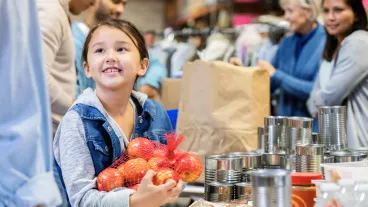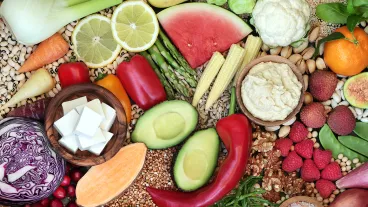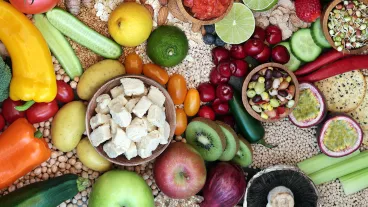Experiences of food insecurity for Australian women and children affected by domestic and family violence
December 2020
Nicole Paterson, Claire Farrugia
People with limited physical and economic access to the quantity and quality of food they need to live an active and healthy life are food insecure.1 In Australia, women are more vulnerable to food insecurity than men,2 and women affected by domestic and family violence (DFV) are particularly vulnerable. These women may face controlled finances, the restriction of money for food, and financial hardship after leaving an abusive partner.3 This short article outlines evidence on experiences of food insecurity for women and children affected by DFV and what works to support them.
How do women and children affected by domestic and family violence experience food insecurity?
In Australia, population-level data on how women and children affected by DFV experience food insecurity is limited. As a form of financial abuse,4 perpetrators can withhold money to control victims,5,6 which can result in a lack of access to food and restricted diets.2 A 2016 ANROWS[†]report measured the financial hardship of 159 women who had experienced DFV, finding that over half had gone without food due to a shortage of money in the previous six months.7 Another Australian report found that 38% of women accessing DFV services request material aid, including food assistance.5
The relationship between DFV and experiences of food insecurity for women and children is complex. Evidence suggests women facing DFV are more likely to face food insecurity and women facing food insecurity are more likely to face DFV.8,9 Both DFV and food insecurity are risk factors for each other and the experience of one can also exacerbate the experience of the other.8 Food insecurity is linked with stressful events (such as those associated with DFV, e.g. witnessing violence, relationship separation), as well as poor mental health, housing stress, low income and unemployment.10
Evidence from the US suggests that the experience of food insecurity for women affected by DFV is not only about limiting food but about restricting the decision-making capacity of women.3 Depending on an abusive partner for access to food can influence a woman’s decision to leave an abusive relationship.6 Without access to regular income or support, leaving a DFV relationship can present new challenges for women and children. A recent online survey of 1,002 Australians showed that single-parent households were most likely to experience food insecurity.2 DFV has a long-term impact on food security for women and children,7 and children experiencing violence or food insecurity risk a number of cognitive, social, behavioural and nutritional challenges.11
What works to respond to food insecurity for women and children affected by DFV?
Community, population and system-level interventions are needed to address the complex relationship between DFV and food insecurity.10 While there is evidence of population responses to food insecurity in Australia, the effectiveness of these responses remains limited, particularly in relation to what works for women and children affected by DFV. Some population-level interventions discussed include income support, paid work and/or stable housing for people experiencing DFV or food insecurity and support for the primary prevention of DFV.10 International research also emphasises the need for a coordinated response between policy and programs, considering the interplay of factors that may be present.8
What works: Identifying food insecurity alongside DFV
- Welfare organisations (e.g. food relief, charities, community organisations) understanding their responsibility to screen for DFV and using appropriate screening tools and DFV services screening for food insecurity.3,6
- When food insecurity and DFV have been identified, practitioners can approach the topic privately, not in the presence of children12 and when there are appropriate services that have been identified by their organisation for referral.8
What works: Responding to food insecurity alongside DFV
- Community organisations supporting initiatives to alleviate the immediate impacts of food insecurity and DFV. Example initiatives can include the provision of food through food banks and meal delivery programs.6,7,13
- Community organisations running social events, forums and networks that can build social support and friendship. Financial, physical and emotional support from friends helps protect against the impacts of DFV and food insecurity.14
- Practitioners assisting women to gain access to income support, paid work and/or stable housing through referral to appropriate services.10,14,15
- Policy and funding bodies adopting strengths-based strategies that address women’s economic security before, during and following experiences of violence, as this can help address food insecurity and DFV.7
- Research, policy and funding bodies supporting the evaluation of initiatives that aim to address health and economic outcomes that contribute to food insecurity16 and initiatives that aim to address the primary prevention of violence against women and children.
Conclusion
Current evidence suggests women and children can be prevented from accessing the right quantity and quality of food. Food insecurity can also be related to financial hardships that increase the likelihood of DFV. The current evidence base underscores the role of practitioners in better identifying and responding to food insecurity during DFV and, in doing so, helping women and children access appropriate support. Further Australian research is needed to understand the experience of food insecurity for women and children affected by DFV.
Related resources
- Understanding food insecurity in Australia
This CFCA practice paper describes the prevalence, experience and impact of food insecurity in Australia, identifying the populations most at risk and exploring various responses and underlying causes. - Identifying and responding to food insecurity in Australia
This CFCA practice guide describes how child and family welfare service practitioners can identify and respond to food insecurity. The paper identifies forms of practical assistance to clients experiencing food insecurity and how to link clients with further supports. - Domestic violence and women’s economic security: Building Australia’s capacity for prevention and redress (final report)
This ANROWS report provides statistical analysis and qualitative evidence on how domestic violence contributes to financial stress among Australian women. - Foodbank Hunger Report 2020: Food Insecurity in the time of COVID-19
This Foodbank report provides an annual snapshot of food insecurity in Australia, with an insight into the experiences of Australian charities and organisations during COVID-19.
References
- 1 Food and Agricultural Organization, Committee on World Food Security. (2012). Coming to terms with terminology. Geneva: FAO. Retrieved from www.fao.org/3/MD776E/MD776E.pdf
- 2 Foodbank Australia. (2019). Foodbank Hunger Report 2019. North Ryde, NSW: Foodbank Australia. Retrieved from www.foodbank.org.au/wp-content/uploads/2019/10/Foodbank-Hunger-Report-2019.pdf
- 3 Ricks, J. L., Cochran, S. D., Arah, O. A., Williams, J. K., & Seeman, T. E. (2016). Food insecurity and intimate partner violence against women: Results from the California Women’s Health Survey. Public Health Nutrition, 19(5), 914–923. doi.org/10.1017/S1368980015001986
- 4 Postmus, J., Hoge, G., Breckenridge, J., Sharp-Jeffs, N., & Chung, D. (2018). Economic abuse as an invisible form of domestic violence: A multicountry review. Trauma, Violence and Abuse, 21(2), 261–283.
- 5 Australian Institute of Health and Welfare (AIHW). (2018). Family, domestic and sexual violence in Australia. Canberra: AIHW. Retrieved from www.aihw.gov.au/getmedia/d1a8d479-a39a-48c1-bbe2-4b27c7a321e0/aihw-fdv-02.pdf.aspx?inline=true
- 6 Conroy, A. A., Cohen, M. H., Frongillo, E. A., Tsai, A. C., Wilson, T. E., Wentz, E. L. et al. (2019). Food insecurity and violence in a prospective cohort of women at risk for or living with HIV in the U.S. PloS one, 14(3), e0213365. doi.org/10.1371/journal.pone.0213365
- 7 Cortis, N., & Bullen, J. (2016). Domestic violence and women's economic security: Building Australia's capacity for prevention and redress: Final report (ANROWS Horizons, 05/2016). Sydney: ANROWS.
- 8 Maynard, M., Andrade, L., Packull-McCormick, S., Perlman, C. M., Leos-Toro, C., & Kirkpatrick, S. I. (2018). Food insecurity and mental health among females in high-income countries. International Journal of Environmental Research and Public Health, 15(7), 1424. doi.org/10.3390/ijerph15071424
- 9 Hatcher, A. M., Stöckl, H., McBride, R. S., Khumalo, M., & Christofides, N. (2019). Pathways from food insecurity to intimate partner violence perpetration among peri-urban men in South Africa. American Journal of Preventive Medicine, 56(5), 765–772. doi.org/10.1016/j.amepre.2018.12.013
- 10 Temple, J. B. (2018). The association between stressful events and food insecurity: Cross-sectional evidence from Australia. International Journal of Environmental Research and Public Health, 15(11), 2333. doi.org/10.3390/ijerph15112333
- 11 Laurenzi, C., Field, S., & Honikman, S. (2020). Food insecurity, maternal mental health, and domestic violence: A call for a syndemic approach to research and interventions. (Commentary) (Report). Maternal and Child Health Journal, 24(4), 401–404. doi.org/10.1007/s10995-019-02872-8
- 12 Cutts, D., & Cook, J. (2017). Screening for food insecurity: Short-term alleviation and long-term prevention. American Journal of Public Health, 107(11), 1699–1700. doi.org/10.2105/AJPH.2017.304082
- 13 Loopstra, R. (2018). Interventions to address household food insecurity in high-income countries. Proceedings of the Nutrition Society, 77(3), 270–281. doi.org/10.1017/S002966511800006X
- 14 Kleve, S., Davidson, Z., Gearon, E., Booth, S., & Palermo, C. (2017). Are low-to-middle-income households experiencing food insecurity in Victoria, Australia? An examination of the Victorian Population Health Survey, 2006–2009. Australian Journal of Primary Health, 23(3), 249–256. doi.org/10.1071/PY16082
- 15 Breiding, M. J., Basile, K. C., Klevens, J., & Smith, S. G. (2017). Economic insecurity and intimate partner and sexual violence victimization. American Journal of Preventive Medicine, 53(4), 457–464. doi.org/10.1016/j.amepre.2017.03.021
- 16 Yii, V., Palermo, C., & Kleve, S. (2020). Population‐based interventions addressing food insecurity in Australia: A systematic scoping review. Nutrition and Dietetics, 77(1), 6–18. doi.org/10.1111/1747-0080.12580
[†] Australia’s National Research Organisation for Women’s Safety
GettyImages/SDI Productions
Related publications

Families and food: Identifying and responding to food…
This webinar explored and demonstrated ways to identify and support food-insecure families.
Read more
Identifying and responding to food insecurity in Australia
This practice guide provides evidence-based guidance on screening for and supporting those faced with food insecurity…
Read more
Understanding food insecurity in Australia
This practice paper reviews the evidence on food security and describes the prevalence, impact and experience of food…
Read more